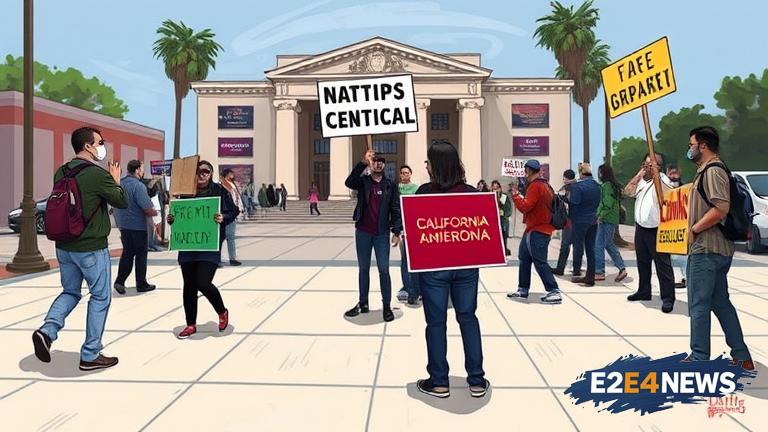In a recent development, a federal judge has issued a temporary restraining order against Immigration and Customs Enforcement (ICE) raids in Southern California. This decision has been hailed as a major victory by immigration advocates, who have been fighting against the raids for months. The ruling comes after a lawsuit was filed by a group of detainees and advocates, challenging the constitutionality of the ICE raids. The plaintiffs argued that the raids were being conducted without proper warrants or probable cause, and that they were targeting individuals who were not a threat to public safety. The judge’s decision has been seen as a significant setback for the ICE, which has been conducting raids in the region as part of its efforts to enforce immigration laws. The temporary restraining order will remain in place until a further hearing can be held, at which point the judge will decide whether to extend the order or allow the raids to resume. The decision has been welcomed by immigration advocates, who say that it will help to protect the rights of immigrants and prevent unnecessary deportations. However, the ICE has stated that it will continue to enforce immigration laws and will seek to appeal the decision. The case has highlighted the ongoing debate over immigration policy in the United States, with many arguing that the current system is broken and in need of reform. The issue has also sparked tensions between the federal government and local authorities, with some cities and states refusing to cooperate with ICE raids. The temporary restraining order has been seen as a significant victory for the detainees and advocates, who have been fighting against the raids for months. The ruling has also been welcomed by community leaders, who say that it will help to reduce fear and anxiety among immigrant communities. The case is likely to have significant implications for immigration policy in the United States, and will be closely watched by advocates and lawmakers. The decision has also raised questions about the role of the judiciary in shaping immigration policy, and the extent to which the courts can intervene in the enforcement of immigration laws. The ICE has stated that it will continue to prioritize the removal of individuals who pose a threat to public safety, but the temporary restraining order has raised concerns about the agency’s ability to do so. The case has also highlighted the need for comprehensive immigration reform, with many arguing that the current system is in need of overhaul. The temporary restraining order has been seen as a significant step towards protecting the rights of immigrants, but the ongoing debate over immigration policy is likely to continue. The decision has also sparked concerns about the potential impact on public safety, with some arguing that the temporary restraining order could allow dangerous individuals to remain in the country. However, advocates argue that the raids are often targeting individuals who are not a threat to public safety, and that the temporary restraining order will help to prevent unnecessary deportations. The case is likely to have significant implications for the future of immigration policy in the United States, and will be closely watched by lawmakers and advocates. The decision has also raised questions about the role of local authorities in enforcing immigration laws, and the extent to which they should cooperate with ICE raids. The temporary restraining order has been seen as a significant victory for immigration advocates, but the ongoing debate over immigration policy is likely to continue. The case has highlighted the need for a comprehensive and humane approach to immigration policy, one that balances the need to enforce immigration laws with the need to protect the rights of immigrants.





